Attached files
| file | filename |
|---|---|
| 8-K - 8-K - CALADRIUS BIOSCIENCES, INC. | form8-kmarch142018corporat.htm |
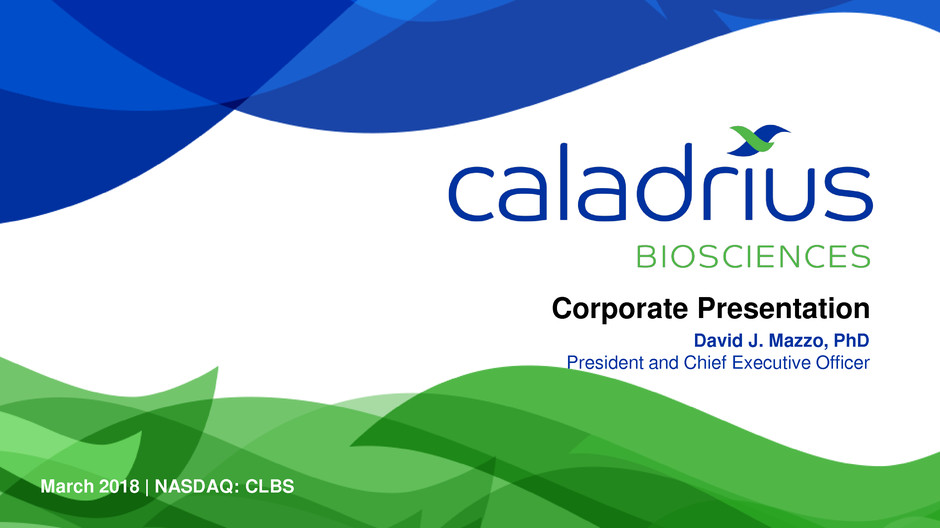
Corporate Presentation
David J. Mazzo, PhD
President and Chief Executive Officer
March 2018 | NASDAQ: CLBS

Safe Harbor for forward-looking statements advisory
This Investor Presentation contains forward-looking statements within the meaning of Private
Securities Litigation Reform Act of 1995. Forward-looking statements reflect management’s
current expectations, as of the date of this presentation, and involve certain risks and
uncertainties. All statements other than statements of historical fact contained in this Investor
Presentation are forward-looking statements. The Company’s actual results could differ
materially from those anticipated in these forward-looking statements as a result of various
factors. Factors that could cause future results to differ materially from the recent results or
those projected in forward-looking statements include the “Risk Factors” described in the
Company’s Annual Report on Form 10-K filed with the Securities and Exchange Commission
(“SEC”) on March 17, 2017, and in the Company’s other periodic filings with the SEC. The
Company’s further development is highly dependent on, among other things, future medical
and research developments and market acceptance, which are outside of its control. You are
cautioned not to place undue reliance on forward-looking statements, which speak only as of
the date of this Investor Presentation. Caladrius does not intend, and disclaims any obligation,
to update or revise any forward-looking information contained in this Investor Presentation or
with respect to the matters described herein.
2
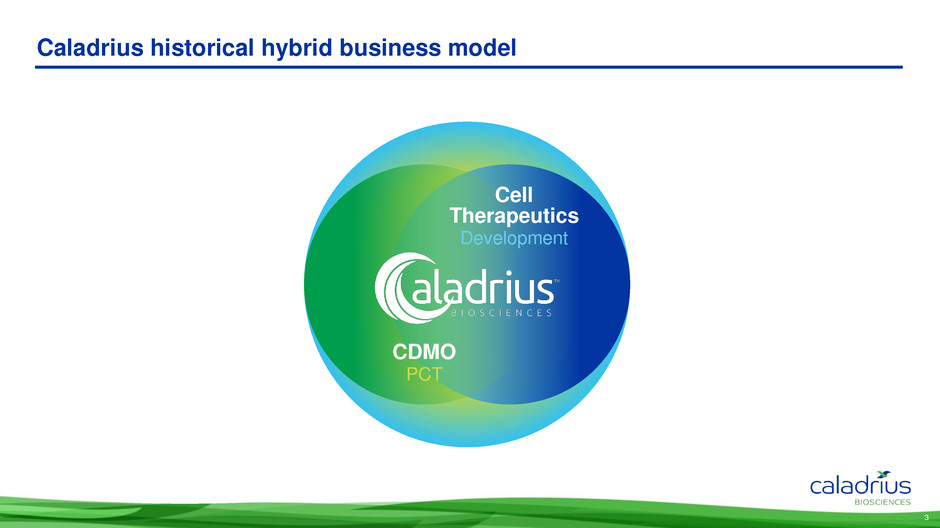
Caladrius historical hybrid business model
3
Cell
Therapeutics
Development
CDMO
PCT

Caladrius recent business model evolution
4
Cell
Therapeutics
Development
CDMO
PCT
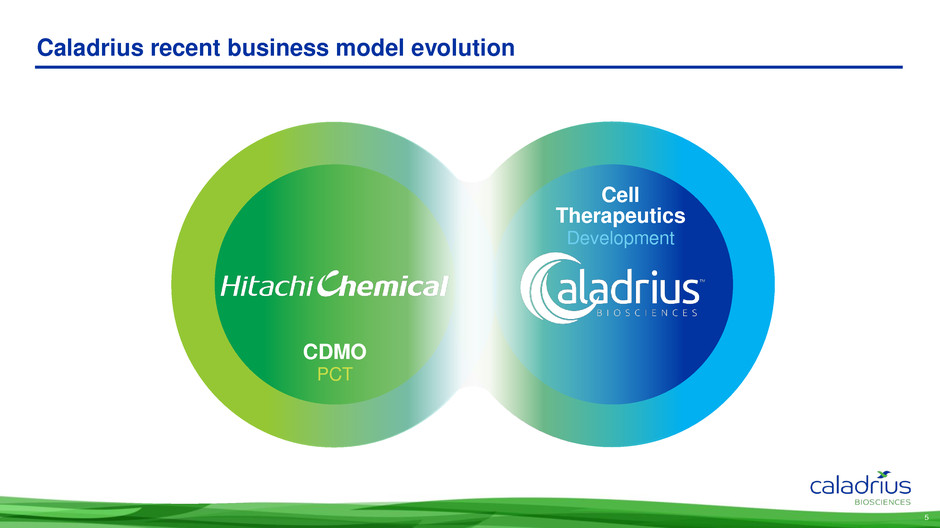
Caladrius recent business model evolution
5
Cell
Therapeutics
Development
CDMO
PCT
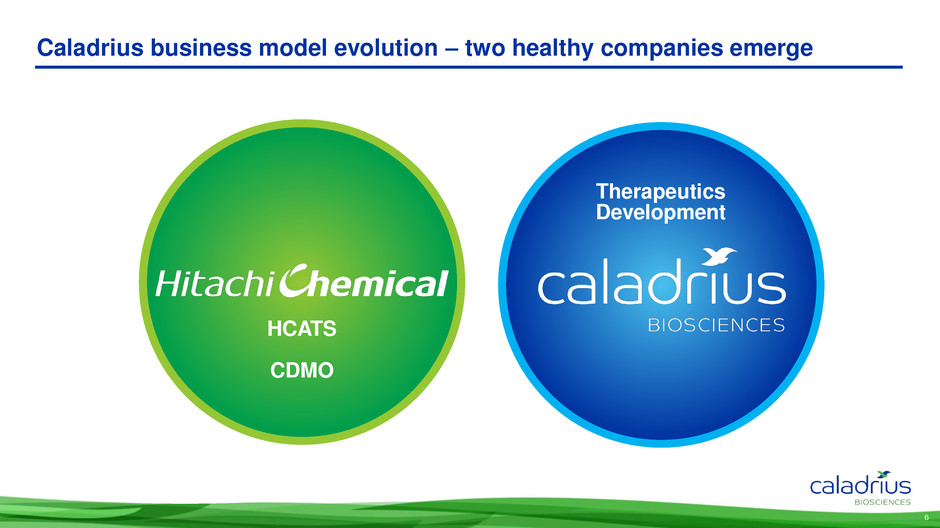
Therapeutics
Development
HCATS
CDMO
Caladrius business model evolution – two healthy companies emerge
6

Therapeutics
Development
Caladrius redefined as financially stable with a simplified corporate profile
7
Capital for Growth
Cell
Therapeutics
HCATS
CDMO
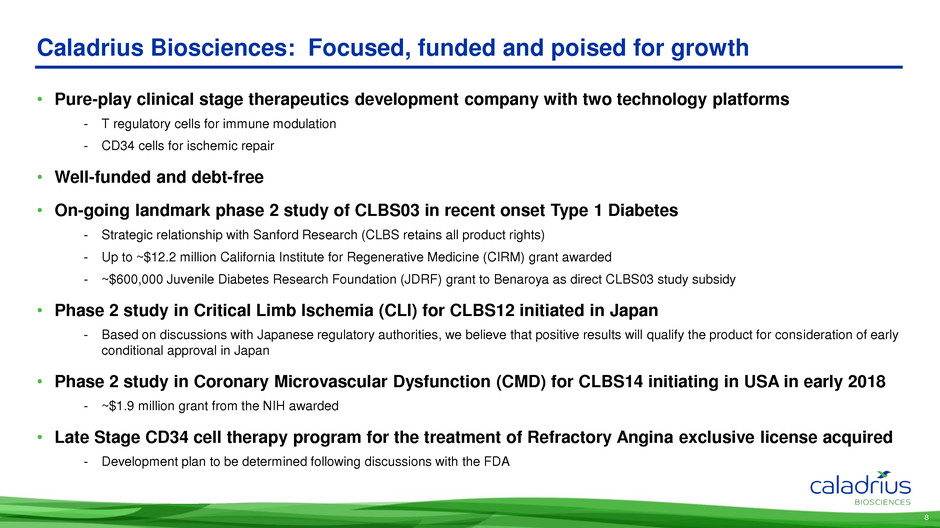
Caladrius Biosciences: Focused, funded and poised for growth
• Pure-play clinical stage therapeutics development company with two technology platforms
- T regulatory cells for immune modulation
- CD34 cells for ischemic repair
• Well-funded and debt-free
• On-going landmark phase 2 study of CLBS03 in recent onset Type 1 Diabetes
- Strategic relationship with Sanford Research (CLBS retains all product rights)
- Up to ~$12.2 million California Institute for Regenerative Medicine (CIRM) grant awarded
- ~$600,000 Juvenile Diabetes Research Foundation (JDRF) grant to Benaroya as direct CLBS03 study subsidy
• Phase 2 study in Critical Limb Ischemia (CLI) for CLBS12 initiated in Japan
- Based on discussions with Japanese regulatory authorities, we believe that positive results will qualify the product for consideration of early
conditional approval in Japan
• Phase 2 study in Coronary Microvascular Dysfunction (CMD) for CLBS14 initiating in USA in early 2018
- ~$1.9 million grant from the NIH awarded
• Late Stage CD34 cell therapy program for the treatment of Refractory Angina exclusive license acquired
- Development plan to be determined following discussions with the FDA
8

Immune Modulation
Autologous, polyclonal T regulatory cells
9

T regulatory cell technology platform built on a strong foundation
• T cell technology licensed from University of California at San Francisco
(Prof. Jeffrey Bluestone – pioneer in T cell biology, et al) and the Centenary Institute
• Autologous, ex-vivo expanded and activated, polyclonal T regulatory cells
• Exclusive rights to an international portfolio of issued and pending patents
• Well-characterized and optimized proprietary manufacturing process
- Discounted development and manufacturing services rates from HCATS through 2024
10
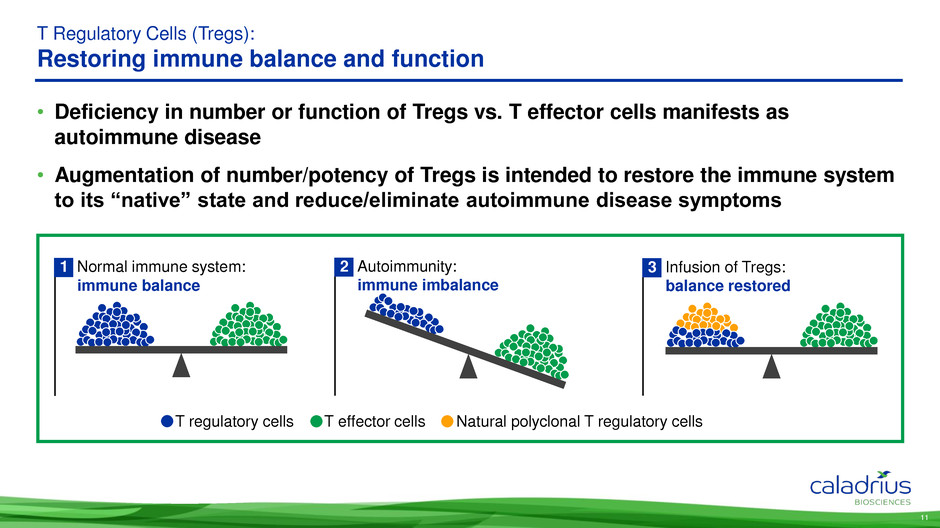
T Regulatory Cells (Tregs):
Restoring immune balance and function
• Deficiency in number or function of Tregs vs. T effector cells manifests as
autoimmune disease
• Augmentation of number/potency of Tregs is intended to restore the immune system
to its “native” state and reduce/eliminate autoimmune disease symptoms
11
1 Normal immune system:
immune balance
2 Autoimmunity:
immune imbalance
3 Infusion of Tregs:
balance restored
T regulatory cells T effector cells Natural polyclonal T regulatory cells

Polyclonal T regulatory cell therapy is potentially applicable across multiple
autoimmune, alloimmune and allergic diseases, many qualifying as orphan
12
Combined markets represent a multi-billion dollar opportunity:
1. Global Patient numbers include total patients from US, EU and Japan only.
2. Annual incidence of type 1 diabetes for patients <15 years old. IDF Diabetes Atlas, 7th Edition.
Recent-Onset
Type 1
Diabetes
Neuromyelitis
Optica (NMO)
Uveitis Cutaneous
Lupus
Graft-versus-
host Disease
(GVHD)
Kidney
Transplant
Scleroderma SLE - Lupus
Global
Patients1
86,0002 13,930 254,869 1,993,080 12,529 3,123 165,537 553,968
Clinical
Study
Endpoints
C-peptide,
insulin use
EDSS,
visual acuity
Response rates CLASI,
Skindex-29
GHVD-free
survival
Failure rates mRSS,
CRISS,
sHAQ
BILAG,
SELENA-
SLEDAI
Biomarkers C-peptide,
others
NMO-IgG
antibody
N/A Cell type
analysis
N/A Renal function Cytokines,
B cells
B cell counts
Additional potential indications:
Lupus Nephritis • Steroid resistant asthma • Rheumatoid arthritis •Multiple sclerosis • Bullous pemphigoid • Crohn’s Disease
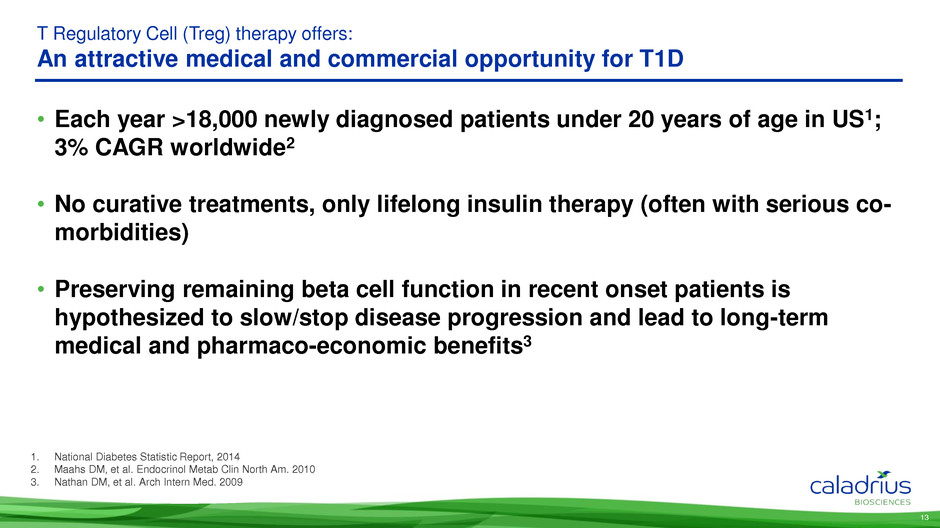
T Regulatory Cell (Treg) therapy offers:
An attractive medical and commercial opportunity for T1D
• Each year >18,000 newly diagnosed patients under 20 years of age in US1;
3% CAGR worldwide2
• No curative treatments, only lifelong insulin therapy (often with serious co-
morbidities)
• Preserving remaining beta cell function in recent onset patients is
hypothesized to slow/stop disease progression and lead to long-term
medical and pharmaco-economic benefits3
1. National Diabetes Statistic Report, 2014
2. Maahs DM, et al. Endocrinol Metab Clin North Am. 2010
3. Nathan DM, et al. Arch Intern Med. 2009
13
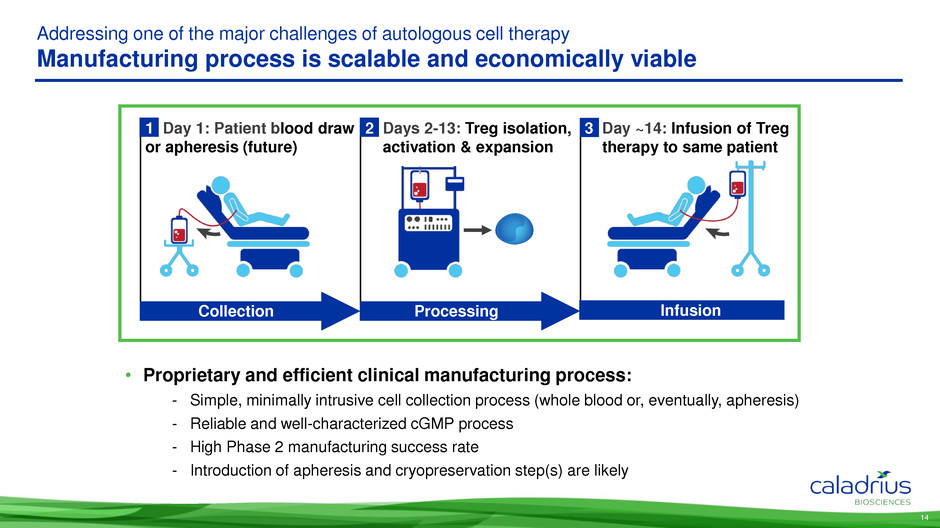
Addressing one of the major challenges of autologous cell therapy
Manufacturing process is scalable and economically viable
• Proprietary and efficient clinical manufacturing process:
- Simple, minimally intrusive cell collection process (whole blood or, eventually, apheresis)
- Reliable and well-characterized cGMP process
- High Phase 2 manufacturing success rate
- Introduction of apheresis and cryopreservation step(s) are likely
1 Day 1: Patient blood draw
or apheresis (future)
3 Day ~14: Infusion of Treg
therapy to same patient
Collection Processing Infusion
2 Days 2-13: Treg isolation,
activation & expansion
14
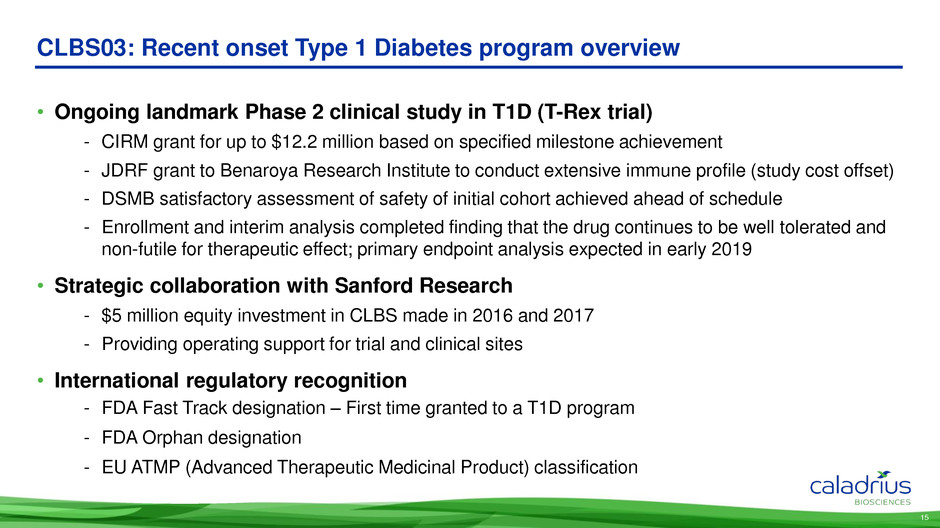
CLBS03: Recent onset Type 1 Diabetes program overview
• Ongoing landmark Phase 2 clinical study in T1D (T-Rex trial)
- CIRM grant for up to $12.2 million based on specified milestone achievement
- JDRF grant to Benaroya Research Institute to conduct extensive immune profile (study cost offset)
- DSMB satisfactory assessment of safety of initial cohort achieved ahead of schedule
- Enrollment and interim analysis completed finding that the drug continues to be well tolerated and
non-futile for therapeutic effect; primary endpoint analysis expected in early 2019
• Strategic collaboration with Sanford Research
- $5 million equity investment in CLBS made in 2016 and 2017
- Providing operating support for trial and clinical sites
• International regulatory recognition
- FDA Fast Track designation – First time granted to a T1D program
- FDA Orphan designation
- EU ATMP (Advanced Therapeutic Medicinal Product) classification
15

CLBS03 to be uniquely positioned in the type 1 diabetes treatment paradigm
16
Chronic blood glucose
management
Disease Modification
(CLBS03)
Function regeneration
Approach Symptom management Reduce or eliminate
disease progression;
potentially “curative”
Replace depleted cells/organs
producing insulin; potentially
“curative”
Insulin
Impact
Improve therapeutic
effect and/or efficiency of
delivery of insulin/analogs
Avoid or reduce need
for insulin by preserving
active beta cells
Avoid or reduce need
for externally-sourced insulin by
providing new beta cells
Availability Currently available with
more in development
Currently in
Phase 2 trial
Many years of
development remaining
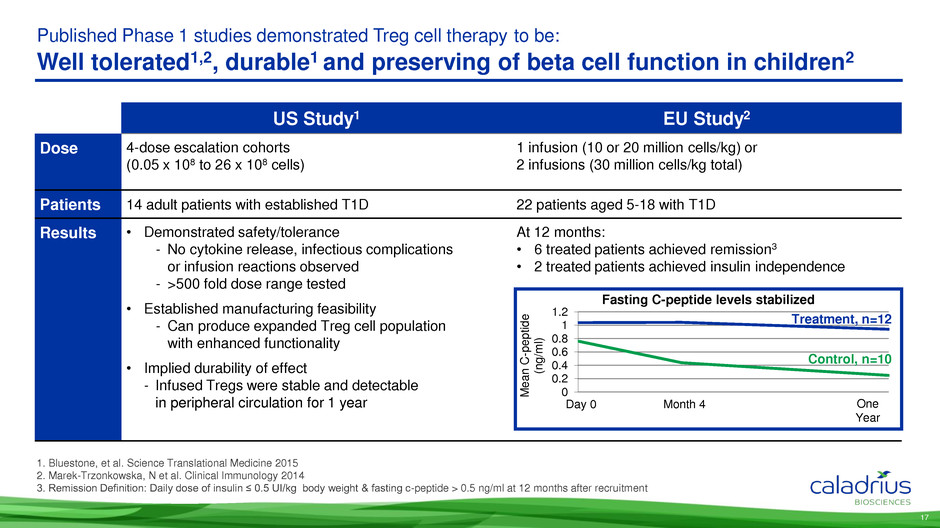
US Study1 EU Study2
Dose 4-dose escalation cohorts
(0.05 x 108 to 26 x 108 cells)
1 infusion (10 or 20 million cells/kg) or
2 infusions (30 million cells/kg total)
Patients 14 adult patients with established T1D 22 patients aged 5-18 with T1D
Results • Demonstrated safety/tolerance
- No cytokine release, infectious complications
or infusion reactions observed
- >500 fold dose range tested
• Established manufacturing feasibility
- Can produce expanded Treg cell population
with enhanced functionality
• Implied durability of effect
- Infused Tregs were stable and detectable
in peripheral circulation for 1 year
At 12 months:
• 6 treated patients achieved remission3
• 2 treated patients achieved insulin independence
Published Phase 1 studies demonstrated Treg cell therapy to be:
Well tolerated1,2, durable1 and preserving of beta cell function in children2
1. Bluestone, et al. Science Translational Medicine 2015
2. Marek-Trzonkowska, N et al. Clinical Immunology 2014
3. Remission Definition: Daily dose of insulin ≤ 0.5 UI/kg body weight & fasting c-peptide > 0.5 ng/ml at 12 months after recruitment
0
0.2
0.4
0.6
0.8
1
1.2
M
e
a
n
C
-p
e
p
ti
d
e
(n
g
/m
l)
Fasting C-peptide levels stabilized
One
Year
Control, n=10
Treatment, n=12
Day 0 Month 4
17

T-Rex Study:
Phase 2 trial in adolescents with T1D initiated in March 2016
18
Rigorous Design
• Double-blind, placebo-controlled, randomized (1:1:1) trial
• Adolescent patients ages 8 to <18 with recent-onset (diagnosed within last 100 days) T1D
Standard Endpoints
• Preservation of C-peptide level, insulin use, severe hypoglycemic episodes, glucose
and hemoglobin A1c levels
Study Size • 110 patients enrolled across ~15 study sites in the USA (enrollment completed in Dec. 2017)
Power • 80% power to detect a 0.2 pmol/mL difference in AUC mean C-peptide between active and placebo
Study Execution • Strategic collaboration with Sanford Research providing operational resources and capital
Treatment • Single infusion of CLBS03 (dose cohorts of 2.5 or 20 million cells/kg) or placebo infusion (control)
For more details: NCT02691247 at www.clinicaltrials.gov

2019
T-Rex study timeline to primary endpoint analysis after 12 months of follow-up
19
• Last patient
randomized
• 6-month follow-up
of 50% of subjects
• 50% of
subjects treated
• 70th subject
enrolled
Interim Analysis of Safety and Early
Therapeutic Effect (futility analysis)*
Topline Data:
Primary Endpoint
12 months follow-up
2016
Study initiation in
March 2016
2017 20181Q 2Q 3Q 4Q 1Q 2Q 3Q 4Q
*March 8, 2018: Treatment continues to be well-tolerated and deemed non-futile for therapeutic effect

Ischemic Repair
CD34 cells
20

CD34 cell therapy is supported by a substantial body of clinical evidence
• CD34 cells have been investigated in clinical studies with >400 patients exposed
- Pre-clinical studies document improved microcirculation1
- Phase 2 clinical studies provide consistent evidence of benefit in safety and function
o Reduced amputation in critical limb ischemia 2
o Improved function in claudication 3
o Reduced angina and improved ETT in refractory angina 4
o Improved mortality and LVEF in dilated cardiomyopathy 5
• Opportunities exist across multiple underserved cardiovascular indications
- Critical limb ischemia (“CLI”) (with specific emphasis in Japan at present)
- Coronary microvascular dysfunction (“CMD”) aka Coronary Syndrome X
- Refractory angina
21
1. Kalka et al. PNAS. 2000; Schatteman et al. J Clin Invest 2000.; Madeddu et al. FASEB. 2004.
2. Losordo et al. Circ Cardiovasc Interv 2012.
3. From US study (n=17); Not yet published
4. Losordo et al. Circ Res 2011.; Povsic et al. JACC Cardiovasc Interv. 2016.
5. Vrtovec et al. Circ Res 2013.

22
Design
• Prospective, open label, controlled, randomized trial
• Patients with no-option CLI
Advantageous
Primary Endpoint
• Time to continuous CLI-free status (2 consecutive monthly visits, adjudicated independently)
Study
Size
• 35 patients to be enrolled across multiple centers in Japan
Treatment • Up to 106 autologous G-CSF-mobilized peripheral blood-derived CD34 cells/kg per affected limb
Control/ comparator
• SOC pharmacotherapy with drugs approved in Japan (e.g., antiplatelets, anticoagulants and
vasodilators)
• Choice of pharmacotherapy will be made by the investigators
Mode of
administration • Intramuscular, 20 injections in affected lower limb in single administration
Timing • Study enrollment open with final results expected mid-late 2019
Japanese development program for critical limb ischemia (CLBS12):
Designed to leverage new regulatory path to early conditional approval
Phase 2 protocol and CMC strategy completed in consultation with Japanese PMDA

US development program for “Syndrome X” (CLBS14-CMD)
Phase 1/2 proof-of-concept study in Coronary Microvascular Dysfunction
23
Design • Interventional, open label, exploratory (proof-of-concept) trial
Primary Endpoint • Safety and the evaluation of adverse events
Secondary Endpoints
• Changes from baseline to 6 months for coronary flow reserve, endothelial-dependent
microvascular function, time to angina; other cardiovascular performances
Study Size • 20 patients to be enrolled at 2 centers in the USA (Cedars Sinai, LA & Mayo Clinic)
Mode of administration • CLBS14 infused into a coronary artery
Timing • Initiation targeted for early Q2 2018 with results expected by end of 2019
Funding • SBIR (NIH) grant for $1.9 million

US development program in Refractory Angina (CLBS14-RfA)
Late Stage Clinical Development Program Data Exclusively Licensed from Shire
• Robust data included in exclusive license
- Phases 1, 2, & 3 clinical studies1,2,3 (combined n=304)
o Meta-analysis results using all three trials
(published in the European Heart Journal, 1/18)
statistically positive, with improvement in total
exercise time, angina frequency and major
cardiac events
o Phase 3 study sponsored by Baxter (prior to
Shire and Baxalta merger) stopped early for
strategic reasons
• CLBS development next steps:
- Reactivate existing (Shire) IND with CLBS as Sponsor
- Meet with the FDA to determine remaining
development requirements to BLA
- Seek grant funding to supplement costs, if available
24
1 Losordo, D.W., et al, Intramyocardial transplantation of autologous CD34+ stem cells for intractable angina: a phase I/Iia double-blind, randomized controlled trial. Circluation, 2007. 115(25): p. 3165-3172
2 Losordo, D.W., et al., Intramyocardial, autologous CD34+ cell therapy for refractory angina. Circ Res, 2011. 109(4): p. 428-36.
3 Povsic, T.J., et al., The RENEW Trial: Efficacy and Safety of Intramyocardial Autologous CD34(+) Cell Administration in Patients With Refractory Angina. JACC Cardiovasc Interv, 2016. 9(15): p. 1576-85.

Grant Partner: NIH SBIR
Country: USA
Pre-Clinical Phase 1 Phase 2 Phase 3
Multi-Product Pipeline Based on Proprietary Technology Platforms
25
Collaborator: Sanford Research
Grant Partners: CIRM & JDRF
Country: USA
Active trial
Trial to be initiated
Clinical development
plan pending FDA
discussions
CLBS14-CMD Coronary Microvascular Dysfunction
CD34 Cell Platform
(Ischemic Repair)
T Regulatory Cell Platform
(Immune Modulation)
CLBS12 Critical Limb Ischemia
CLBS03 Recent Onset Type 1 Diabetes
Country: Japan
CLBS14-RfA Refractory Angina Country: USA
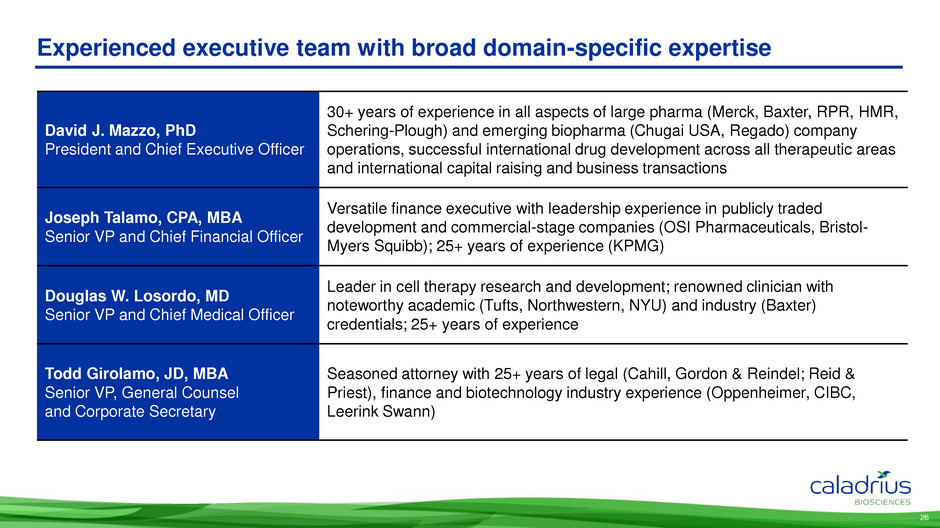
Experienced executive team with broad domain-specific expertise
David J. Mazzo, PhD
President and Chief Executive Officer
30+ years of experience in all aspects of large pharma (Merck, Baxter, RPR, HMR,
Schering-Plough) and emerging biopharma (Chugai USA, Regado) company
operations, successful international drug development across all therapeutic areas
and international capital raising and business transactions
Joseph Talamo, CPA, MBA
Senior VP and Chief Financial Officer
Versatile finance executive with leadership experience in publicly traded
development and commercial-stage companies (OSI Pharmaceuticals, Bristol-
Myers Squibb); 25+ years of experience (KPMG)
Douglas W. Losordo, MD
Senior VP and Chief Medical Officer
Leader in cell therapy research and development; renowned clinician with
noteworthy academic (Tufts, Northwestern, NYU) and industry (Baxter)
credentials; 25+ years of experience
Todd Girolamo, JD, MBA
Senior VP, General Counsel
and Corporate Secretary
Seasoned attorney with 25+ years of legal (Cahill, Gordon & Reindel; Reid &
Priest), finance and biotechnology industry experience (Oppenheimer, CIBC,
Leerink Swann)
26

Key Financials Figures1
27
Current Cash2: $64.5m
2017 Average Quarterly Operating Cash Burn3: $5.4m
Long-term Debt: $0
Common Shares Outstanding: 9.4m shares
Options Outstanding: 1.1m shares
(average exercise price $33.30)
Warrants Outstanding: 0.3m shares
(average exercise price $54.80)
1 As of September 30, 2017
2 Cash, Cash Equivalents, Restricted Cash and Marketable Securities
3 Nine-months ended September 30, 2017

Timeframe
Treg
Platform
• T-rex interim analysis 6 months post treatment of 50% patients 1Q2018 (completed)
• Analysis of 12 month data (primary efficacy endpoint) Early 2019
• 2-year follow-up complete Late 2019
CD34
Platform
• Initiate 35 patient Phase 2 trial of CLBS12 in Japan for critical limb ischemia (CLI) 1Q2018 (completed)
• Begin patient enrollment in 20 patient Phase 2 trial CLBS14-CMD for coronary
microvascular dysfunction (CMD)
1Q2018
• Acquire an exclusive license to a late stage program for the treatment of refractory angina 1Q2018 (completed)
• Reactive IND from Shire for CLBS14-RfA (refractory angina) 2Q2018
• Meet with FDA to finalize CLBS14-RfA development plan 2H2018
• Seek additional grant funding: multiple clinical indications 2018
• Explore additional licensing opportunities 2018
Caladrius offers multiple potential near-term value creating milestones
28

Investor Relations Contact
John D. Menditto
Phone: 908.842.0084
Email: jmenditto@caladrius.com
Web: www.caladrius.com
29
NASDAQ: CLBS
